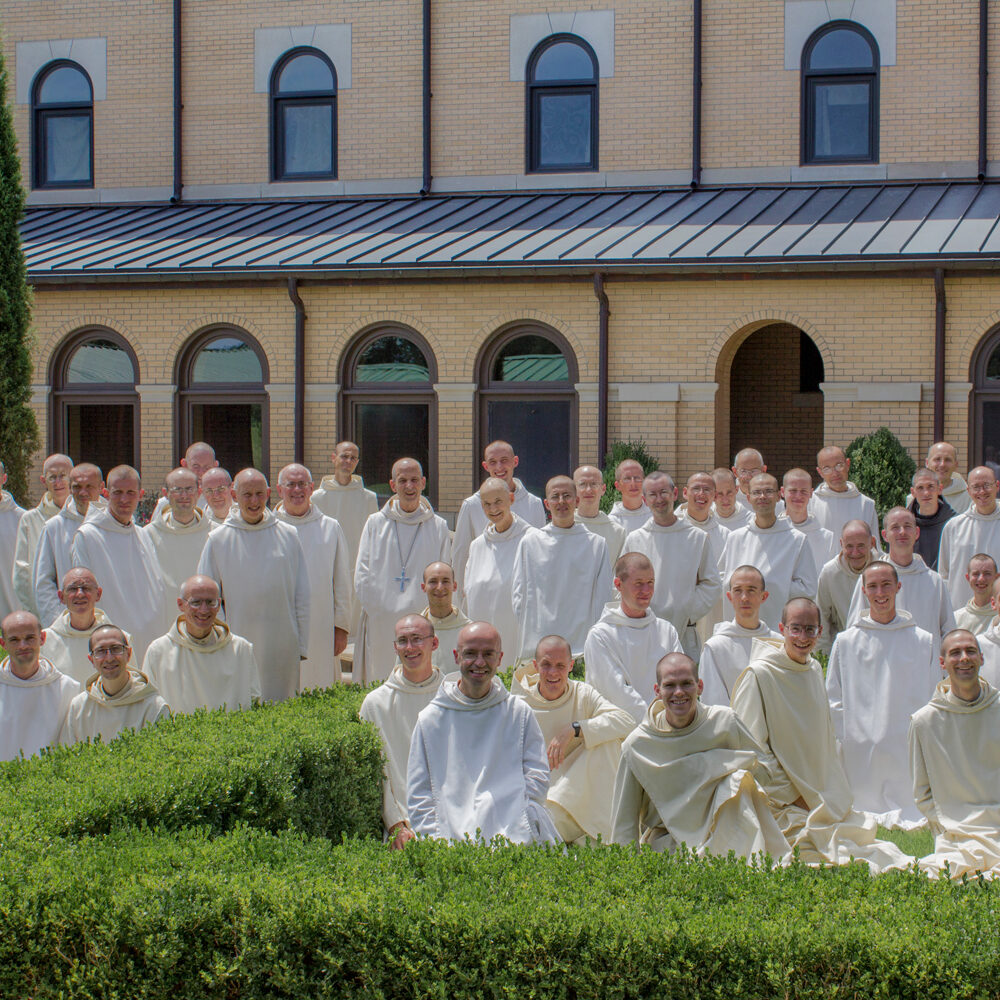Dear Brothers and Sisters in Christ,
My Very Dear Sons,
The mystery of the Ascension of the Lord represents the consummation of a series of displacements, of great movements, involving the Word made flesh. Saint Paul, quoting Psalm 67, explains it thus:
Ascending on high he led captivity captive; he gave gifts unto men. Now, that he ascended, what is it, but because he also descended first into the lower parts of the earth? He that descended is the same also that ascended above all the heavens, that he might fill all things. (Ephesians 4:8-10, citing Psalm 67:19)
Indeed, the Lord Christ, the Word of the Father, had first to go downward, as it were, in order to accomplish His mission, taking upon Himself our human nature, a nature infinitely beneath His Divine Majesty. Christ had first to come down to the stable of Bethlehem and to take up company there with the Shepherds and Magi, with the Ox and the Donkey. He then descended even further, assuming for many years the lowly labors of a village carpenter. His public life, in turn, was one of constantly bending over, like the Good Samaritan, in order to heal the wounds of fallen man. In His terrible Passion, the Lord lowered Himself to wash the feet of His disciples, before taking the sorrowful plunge into the depths of darkness on the Cross at Calvary. Finally, as Saint Paul mentions, He went down, in his human soul, even to the lower parts of the earth, to the Limbo of the Just, in order to lead the Patriarchs and Prophets of old out with Him in the triumph of His Resurrection. Today, however, He takes the opposite road, ascending all the way to the zenith of Heaven, unto the place He never abandoned in His divine nature, but where His glorified human nature will henceforth reign forever.
But what about us? What lesson does this mystery hold for us simple mortals, still treading upon the earth in this 21st century? We are certainly encouraged by Christ’s glorious Ascension into Heaven to hope for a supernatural destiny in this place we call the Kingdom of Heaven. Where our Head, head of the Mystical Body, has ascended before us, we too can and must hope to follow. Perhaps, however, we need to remember the other side of the double movement as described by Saint Paul. We too must first descend; we must be humiliated, trampled upon as it were in this life in some manner, if we want to join Christ in His glory. Such is very much the lesson Saint Benedict gives us in his Rule.
The Holy Scripture cries out to us, brethren, saying: “Everyone that exalteth himself shall be humbled, and he that humbleth himself shall be exalted.” In saying this, [explains the Patriarch of monks,] it teaches us that all exaltation is a kind of pride, against which the prophet shows himself to be on guard when he says: “Lord my heart is not exalted nor mine eyes lifted up; nor have I walked in great things and in wonders above me.” (Chapter 7, citing Luke 14:11 and Ps 130:1)
Closer to us, some voices have raised the alarm in this regard, asserting that too many traditional-minded Catholics are losing, in fact, this sense of humility. I would like to quote here a passage from a recent talk by Father Chad Ripperger on the subject.
[There] are general problems that you see, pretty much across the board, in almost every traditionalist apostolate. I just want people to be aware that these are the kinds of problems we are up against, and why it is actually causing damage to the traditionalist movement, and why the traditionalist movement isn’t being recouped as quickly. … There are particular problems that really need to be addressed because they are very grave, actually. … The first has to do with the fact that the traditionalist movement is slowly becoming a gnostic movement. By gnostic we mean, they think that they only have this secret knowledge that nobody else seems to have right now, and that there is something special about them because they get it and these other people don’t. And, how do we know it is becoming gnostic? Because they are constantly looking down and badmouthing anybody who goes to the new Mass. Then there is also another gnostic side to the traditional movement, and it is this isolationist attitude in relationship to the world.… How can we evangelize people; how are we honestly going to attract people to Mass… here … if we look down on them? It’s basic psychology that people are naturally not going to go to a place where people are looking down on them. Source
If, as we well know, Holy Mass is the greatest and most beautiful reality upon this earth, and if the older form of the Roman rite possesses an incomparable liturgical perfection, being the most venerable form of the rite, let this traditional liturgy continue to teach us, not only the transcendence of Christ in His glorious Ascension, but also the great humility we need to have, if we want to arrive at the Kingdom of Heaven some day. Such is the path of the Saints: a going down into the depths of humility, in order to rise with Christ to the highest regions above. May Our Lady, the most humble of pure human creatures, be our guide in understanding the Ascension and the humility it teaches us along with the bright Hope of Heaven. Amen. Alleluia.




